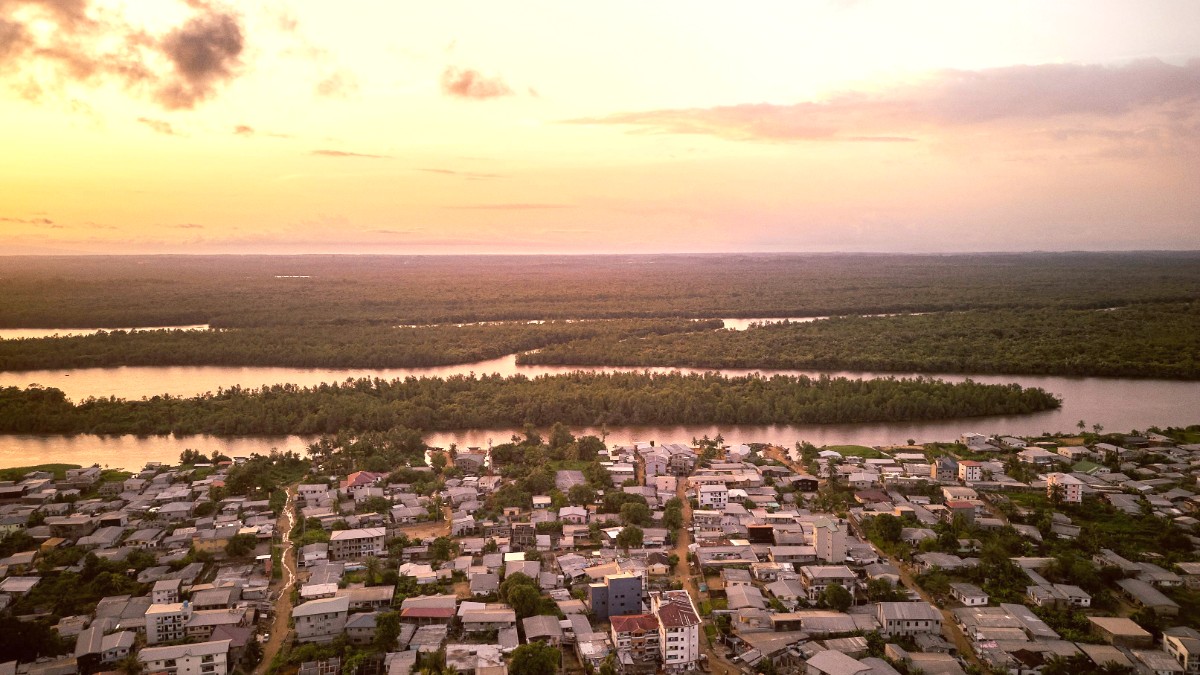
Cameroon
Temperatures generally stay between 25-28°C (77-82°F), with humidity levels often ranging from 80-95%. The city experiences a clear wet season and a dry season.
This period yields lower humidity, less rain, and slightly cooler evenings. Temperatures range from 24-30°C (75-86°F). The Harmattan wind, carrying dry, dusty air from the Sahara, occasionally influences this season.
Expect heavy rainfall, high humidity, and steady temperatures. Rain peaks between June and September, with average monthly precipitation often exceeding 400 mm (16 inches).
Douala receives substantial monsoon-like rainfall during its wet season. This sometimes leads to localized flooding, especially in low-lying parts of the city. The city's equatorial location generally means it does not experience hurricanes.
November to February
Weather most pleasant, less rain. Ideal for outdoor activities and sightseeing. Travel simpler with better road conditions.
Higher demand for flights/accommodations, sometimes results in increased prices. More tourists at popular sites.
March, October
Fewer tourists than peak dry season, with lower prices. Weather remains good.
Weather unpredictable. Some rain expected.
April to September
Lowest prices for flights and accommodations. Landscapes lush and green. Experience a more authentic local scene with fewer tourists.
Heavy and frequent rainfall might disrupt travel plans and outdoor activities. High humidity can feel uncomfortable. Some roads might become impassable.
General sightseeing and outdoor activities find the dry season (November-February) the most pleasant.
Business travel generally prefers the dry season for easier movement and comfort. Timing for cultural events varies; check local event calendars as some occur during the wet season.
June to September, exceeding 400 mm (16 inches) monthly.
Dry, dusty winds occasionally affect the dry season.
Localized flooding might occur during heavy wet season rains.
Equatorial location generally means no hurricanes.
Temperatures remain largely constant year-round.
Travelers to Cameroon need proper documentation. Plan your visa application in advance to avoid delays.
Most foreign nationals need a visa to enter Cameroon. Applications usually process at a Cameroonian embassy or consulate in your country of residence.
Gather the following for your visa application:
The currency of Cameroon is the Central African CFA Franc (XAF). It links to the Euro (€1 = 655.957 XAF).
Be aware of local conditions and prepare accordingly.
For all travelers aged 9 months and older.
Hepatitis A and B, Typhoid, Rabies, Meningococcal Meningitis. Confirm routine vaccinations are current.
Take prescribed antimalarial medication. Use mosquito nets, long sleeves, and Insect repellent.
Diarrhea (Traveler's Diarrhea) occurs very commonly. Maintain strict food and water hygiene.
Typhoid/Cholera risks exist. Confirm food is thoroughly cooked, and water is purified or bottled. Avoid swimming or wading in freshwater bodies (Schistosomiasis).
Tap water is generally not safe. Use Bottled water from reputable sources; verify the seal is unbroken. A Portable water filter bottle offers an additional safety measure. Avoid ice cubes unless certain they come from purified water.
Only eat hot, freshly cooked food. Avoid raw or undercooked meat, unpeeled fruits, and salads washed in tap water. Exercise caution with street food; select vendors with high turnover and visible hygiene practices.
Several private clinics and hospitals offer care, though standards remain below Western levels. Medical evacuation for serious conditions often becomes a necessity and is very expensive.
Douala General Hospital, Polyclinique Bonanjo, Laquintinie Hospital.
Limited and often slow. Dialing local numbers may not always yield immediate results. General Emergency: 17 (Police), 18 (Fire), 19 (Ambulance).
Douala experiences moderate crime levels, including petty theft, pickpocketing, and occasional armed robberies.
Stay aware of your surroundings, especially in crowded places. Carry only copies of important documents and leave originals in a secure location.
Avoid walking alone at night. Use pre-arranged taxis from reputable hotels or trusted contacts after dark.
Do not display valuables (jewelry, electronics, large sums of cash).
Exercise caution with scams, specifically at the airport or bus stations.